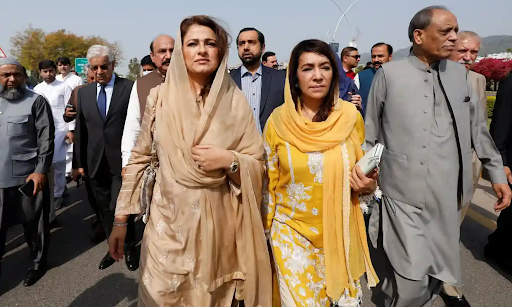Pakistani Prime Minister Dissolves Parliament and Calls for General Elections
Pakistani paramilitary troops stationed outside the National Assembly in Pakistan’s capital city, Islamabad, on Sunday, April 3, 2022. Photo: Anjum Naveed/AP
On Sunday, in a move that shocked the nation, Prime Minister Imran Khan dissolved Pakistan’s parliament ahead of a no-confidence motion initiated against him by his political opposition. Khan narrowly survived the attempt to oust him as Pakistan's Prime Minister when the no-confidence motion against him was officially blocked by the deputy speaker in Pakistan’s parliament. The Prime Minister was expected to lose the vote as many politicians, including defectors from his own party, Pakistan Tehreek-e-Insaf (PTI), called for his removal as head of state.
The no-confidence motion initiated by the opposition arose from a tumultuous period of political and economic instability in Pakistan under Khan’s leadership. The opposition gained increasing momentum once the Pakistani Army– which is notorious for intervening in the government's affairs– revoked its long-standing support of Khan’s rule.
Imran Khan’s supporters are seen marching in the streets waving flags of Khan’s political party PTI. Photo: Rahmat Gul/AP
Upon the Prime Minister’s request, Pakistan’s President Arif Alvi dissolved the National Assembly, merely a few moments after the Deputy Speaker of Parliament rejected the no-confidence motion. Shortly after, in a televised speech, Khan called for general elections to take place, claiming that the conspiracy by foreign powers– namely the United States– who he accuses of orchestrating his removal from office, will not be successful. “Prepare for elections,” announced Khan. “No corrupt forces will decide what the future of the country will be.”
The dissolution of parliament was met with severe opposition, with many of Khan’s adversaries describing the action as unconstitutional. The Parliamentary Secretary for Law and Justice, Maleeka Bokhari, used the same term to justify the rejection of the no-confidence motion, claiming, “...no democratic state, no independent sovereign state, can allow the removal of the prime minister through such unconstitutional means.”
Khan’s unexpected decision left the entire nation in a state of frenzy. The backlash that followed forced the Pakistani Army to speak out– an unusual move on their part– and clarify that they did not have anything to do with this decision. The Deputy Attorney General of Pakistan, Raja Khalid, resigned from his position after expressing his anxiety and frustration. “It has become difficult for me to defend the government’s 'unconstitutional measures' anymore, therefore, I tender my resignation as Deputy Attorney General of Pakistan,” declared Khalid. Meanwhile, other members of Khan’s coalition flocked to join the opposition as a form of protest against his recent move.
United opposition lawmakers seen walking towards the parliament building in Islamabad. Photograph: Akhtar Soomro/Reuters
Infuriated by Khan’s circumvention of the no-confidence vote, members of the opposition parties expressed their disdain: Bilawal Bhutto Zardari, leader of the opposition party Pakistan People’s Party (PPP), expressed his dismay over the cancellation of the no-confidence vote and vowed to challenge the decision in Pakistan’s Supreme Court. “We are ready for the general elections but we cannot allow violation of the rules and the constitution,” said Bhutto. “The court is bound to side with the constitution of Pakistan.” Marriyum Aurangzeb, a spokeswoman for one of Pakistan’s leading opposition parties Pakistan Muslim League-Noon (PML-N), called Khan’s actions a “blatant violation” of the country’s constitution.
Amidst the ongoing political crisis, Khan will continue to hold office for 90 days until the next general elections take place, after which either Khan will be re-elected as Prime Minister, or Pakistan will see an entirely new government assume power.



